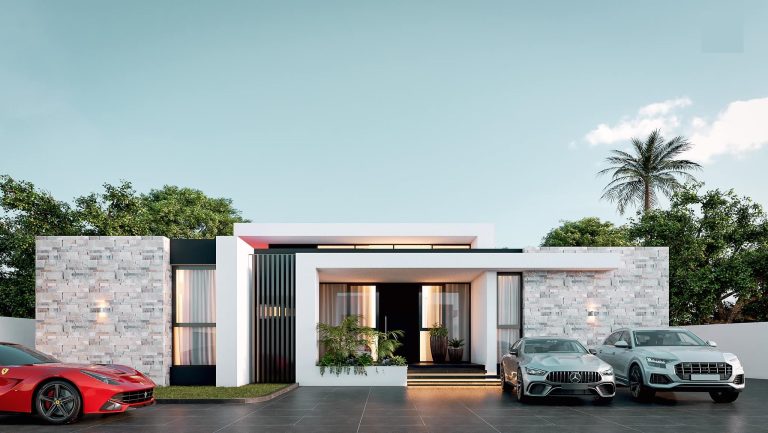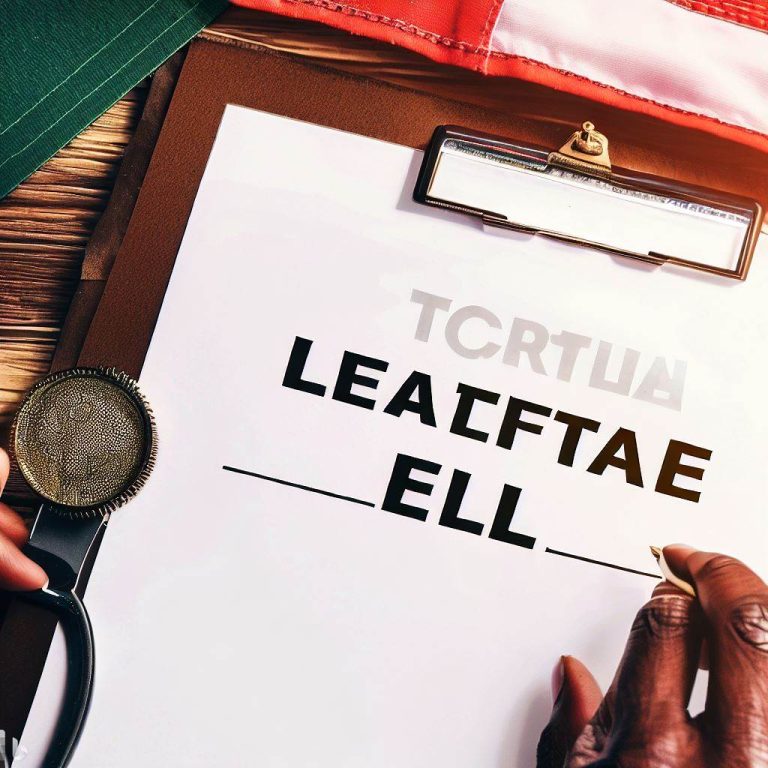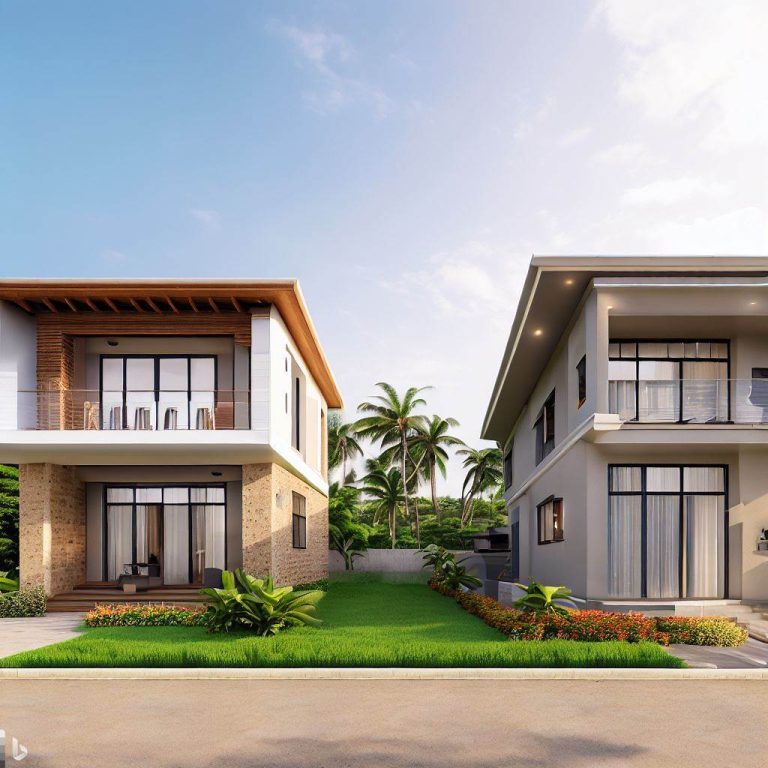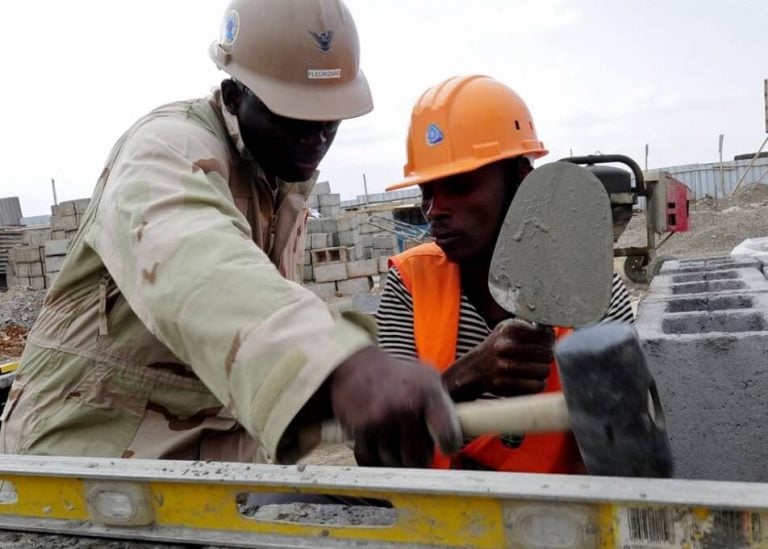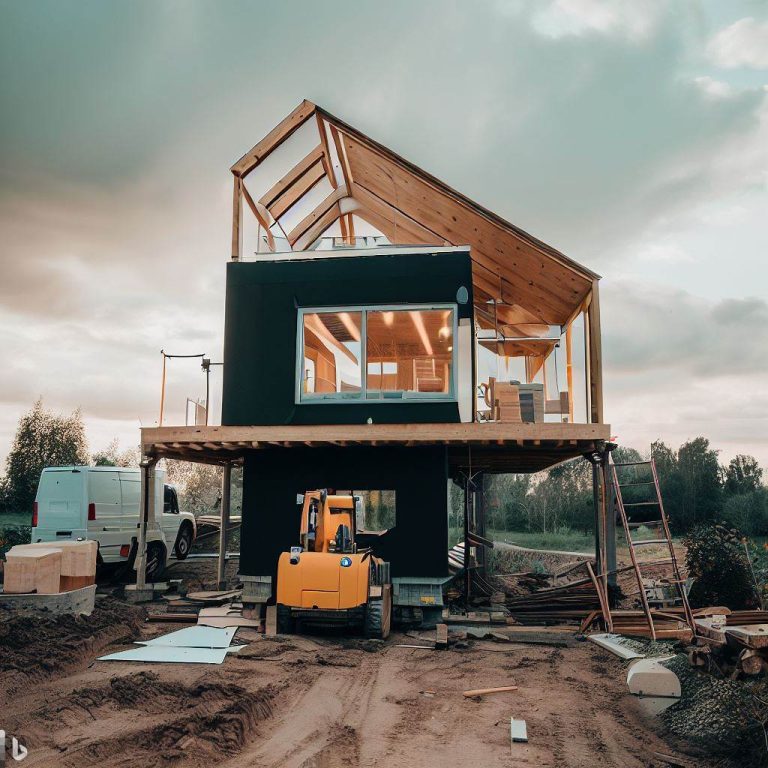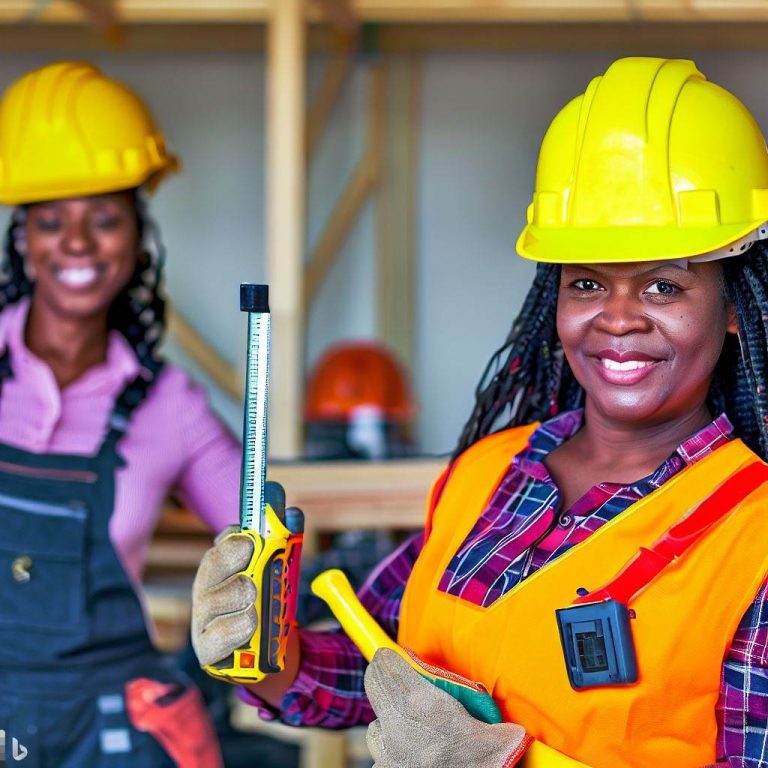Cost of Building a House in Ghana
|
Getting your Trinity Audio player ready...
|
If you’re planning to build a house in Ghana, you’re probably wondering what it will cost. You need to understand house building costs before starting the process as it’s a significant investment.
In this blog post, we’ll take a detailed look at the cost of building a house in Ghana. This will include land, design and engineering, building materials, labor, finishing and fixtures, and utilities and fees.
We’ll also provide tips and strategies for keeping costs down and maximizing your budget.
You will learn the cost of building your dream home in Ghana by the end of this post. So whether you’re a first-time home builder or an experienced developer, this post is for you
Read Also: Artisans you need to build your house in Ghana
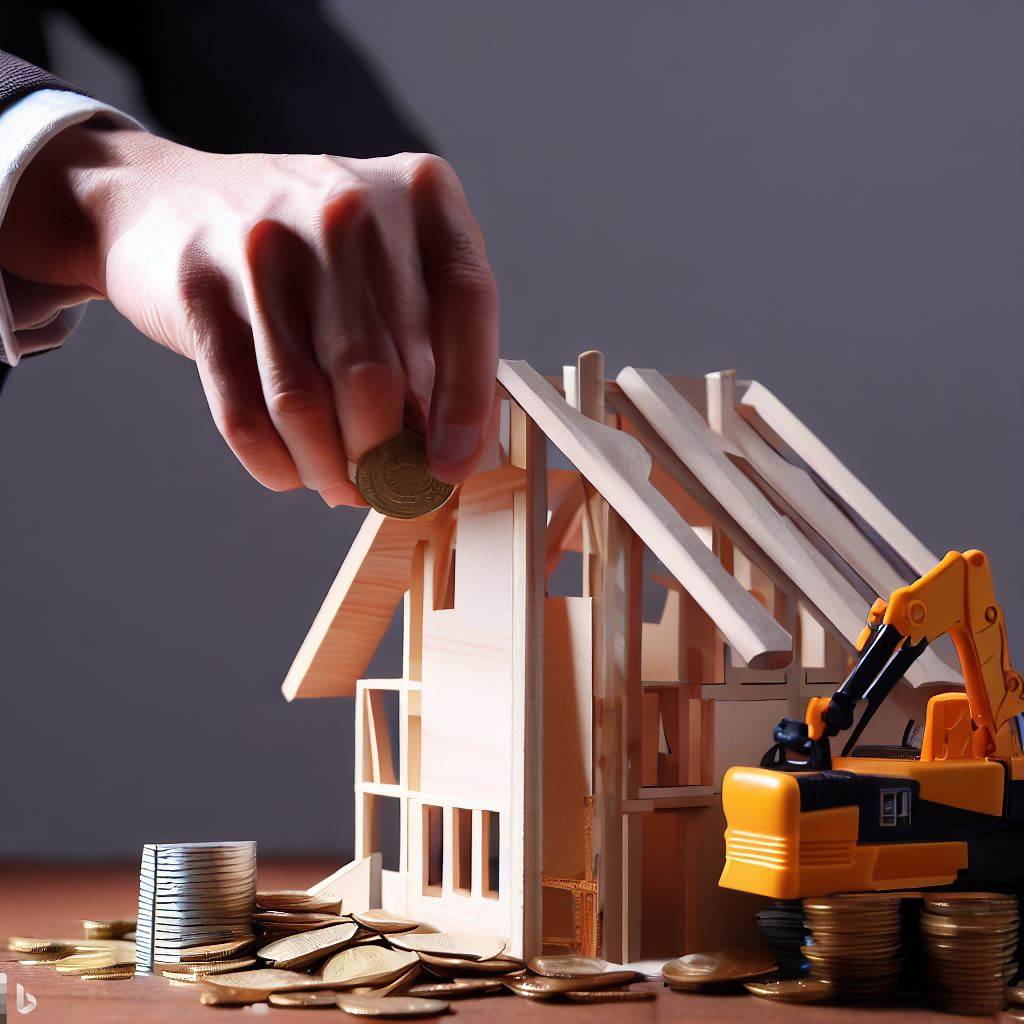
The Cost components
Here is a List of costs you may incur on your journey to build your house in Ghana.
- Land cost
- Building Design Fees
- Building Permit Cost
- Materials and Construction Equipment Cost
- Labor cost
- Utility Cost (Water and electricity connection cost)
The cost of building a house in Ghana is one crucial piece of information
Land cost
One of the major costs to consider when building a house in Ghana is the cost of land. This can vary significantly depending on the location and size of the property. In general, land in urban areas tends to be more expensive than land in rural areas.
Land cost is the most significant expense in building a house in Ghana. It varies by location and other factors from GH¢50,000 ($9,000) to GH¢500,000 ($90,000) or more
Also,factors such as access to utilities, transportation, and other amenities can influence the cost of land.
It’s important to do your research and compare prices in different locations to find the best deal.
Building Design and Engineering Fees
Once you have a piece of land, you’ll need to hire an architect or designer to create a building plan.
House construction complexity determines need for architect or engineer.The cost professional fees can range from $360 to $9,000 or more.
This covers costs for the architect, structural engineer, MEP engineer, and potentially other professionals such as interior or landscape designers.
Before starting the project, it’s important to get a clear breakdown of fees that can vary based on its complexity..
Read Also: Building Your House In Ghana-The Quick Easy Guide
Building Permit Fees
Once you have your design plans, you’ll need to obtain a building permit from your local government. Building permit cost varies based on project size, complexity, and local regulations.
Factor this cost into your budget, as you must require it before beginning construction.
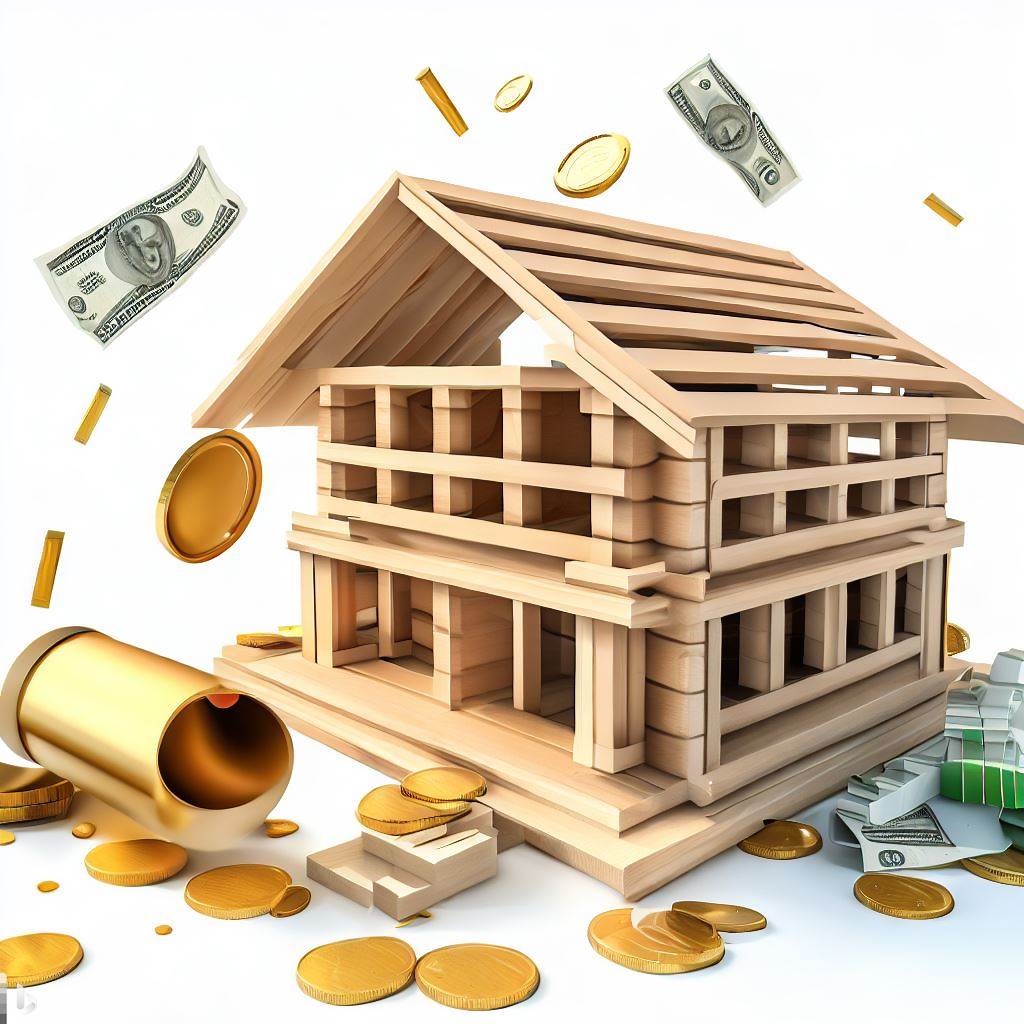
Building Materials and Construction Tools and Equipment Cost
Building a house in Ghana incurs a major cost in materials and construction equipment.
The cost of materials can vary depending on the type of materials you choose and the quantity you need. Using high-quality materials such as brick or concrete can cost more than using wood or cheaper alternatives.
You’ll also need to consider the cost of construction equipment like excavators, bulldozers, and cranes. These costs can add up quickly, so it’s important to carefully plan your budget.
List of Some Building Materials You may need
The cost of building materials will depend on the type of materials you choose and the quantity needed. Materials for a house can cost anywhere between $900 to over $18,000 depending on its size and level of luxury.
Here is a list of some materials you may need to build your house in Ghana:
- Cement
- Sand
- Gravel
- Steel reinforcement bars (rebar)
- Bricks
- Timber
- Roofing sheets
- Windows and doors
- Plumbing materials (pipes, fittings, etc.)
- Electrical materials (wiring, outlets, switches, etc.)
- Flooring materials (tiles, wood, carpet, etc.)
- Paint and other finishing materials (trim, crown molding, etc.)
- Hardware (nails, screws, bolts, etc.)
- Insulation materials (foam board, fiberglass, etc.)
- Landscaping materials (garden soil, plants, etc.)
It’s important to carefully consider your budget and the materials you need when building a house in Ghana. To stay within budget, trade-offs may be necessary as certain materials can be more expensive than others. It’s also a good idea to shop around and get quotes from multiple suppliers to find the best prices.
List of Some Tools and Equipment You may need
Here are some tools and equipment you may need to build your residential house in Ghana:
- Excavator,
- Bulldozer,
- Crane,
- Concrete mixer,
- Power drill,
- Saw,
- Hammer,
- Trowel,
- Screwdriver.
There may be other tools and equipment that are specific to your project and your location. Consulting with a building professional is essential to ensure you have all the necessary tools and equipment for your project.
Labor cost Cost of Building a House in Ghana
Labor costs are another important factor in the cost of building a house in Ghana. You’ll need to hire skilled workers to complete various tasks like laying foundations, framing, and installing electrical and plumbing systems.
Labor costs vary based on workers’ experience and expertise, location, and demand for services.
The labor cost also depends on the type and amount of work required.
Labor for a project can cost between GH¢5,000 ($900) to over GH¢50,000 ($9,000) depending on its size and complexity.
Before the Building Construction starts you need a building design. The building design cost will depend on the building team you engage. These include
- Land surveyor fees
- Architectural Design fees
- Structural Engineering fees
- Mechanical Engineering fees
- Electrical Engineering fees
- Quantity surveyor fee
- Foreman
- Laborers
- Mason
- Steel bender
- Carpenter
- Electrician
- Plumber
- Tiler
- Pop
- Stone masons
Finishing and fixtures:
The cost of finishing and fixtures for a house is determined by the type of finishes chosen, such as paint, tiles, and plumbing fixtures.
The total amount can range from GH¢5,000 ($900) to over GH¢50,000 ($9,000), depending on factors like the size of the house and the level of luxury desired.
Utility Cost of Building a House in Ghana
Finally, you’ll need to consider utility costs like water and electricity connection fees. These costs can vary depending on your location and the type of utilities you need.
Utility and fee costs (electricity, water connections, etc.) vary based on location and connection type for your house. The cost of utilities and fees can range from GH¢1,000 ($180) to GH¢5,000 ($900) or more.
Budget for and plan to connect your home to essential services.
Conclusion
In summary, the cost of building a house in Ghana is a complex and multifaceted process. The total cost of building a house in Ghana will depend on the size and complexity of the project and the materials and finishes you choose.
This can range from GH¢100,000 ($18,000) for a small, basic house to GH¢500,000 ($90,000) or more for a larger, more luxurious house.
There are many factors to consider, including land costs, building design fees, building permit fees, materials and construction equipment costs, labor costs, and utility costs.
By carefully planning and budgeting for these costs, you can build your dream home in Ghana without breaking the bank.By understanding the costs involved and planning your budget carefully, you can ensure that your building project stays on track and within budget.
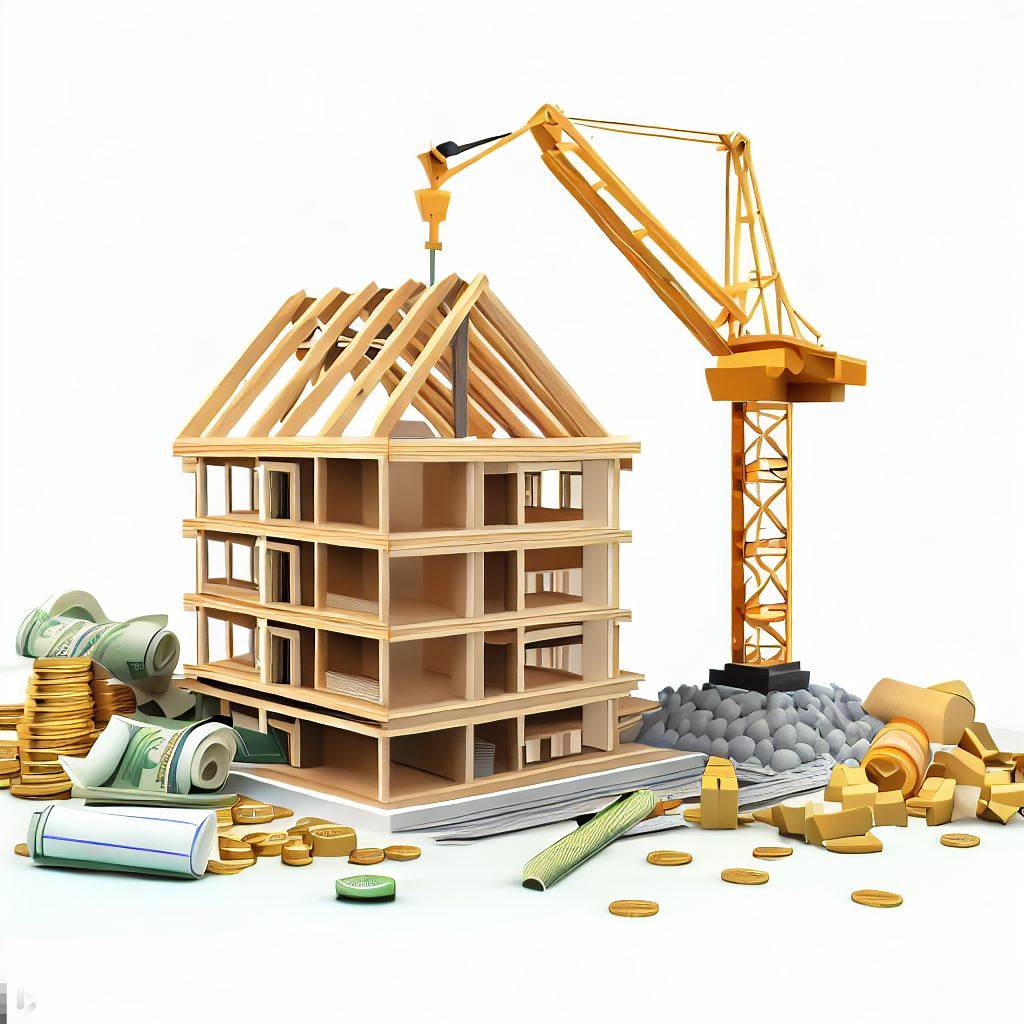
FAQ : Cost of Building a House in Ghana
Q: How much does it cost to build a house in Ghana?
A: The cost of building a house in Ghana can range from GH¢100,000 ($18,000) for a small, basic house to GH¢500,000 ($90,000) or more for a larger, more luxurious house. The total cost will depend on factors such as the size and complexity of the project, the materials and finishes you choose, and the location of your house.
Q: What are the main costs involved in building a house in Ghana?
A: The main costs involved in building a house in Ghana include land, design and engineering, building materials, labor, finishing and fixtures, and utilities and fees.
The cost of land is typically the most significant, as land prices vary widely depending on location and other factors.
The design and engineering cost will depend on the complexity of the project, and the cost of building materials will depend on the type and quantity needed.
The cost of labor will depend on the type of work being done and the number of workers needed, and the cost of finishing and fixtures will depend on the type of finishes you choose.
Finally, the cost of utilities and fees, such as electricity and water connections, will depend on the location of your house and the type of connections needed.
Q: How much does it cost to build a foundation in Ghana?
A: The cost of building a foundation in Ghana can vary depending on a number of factors, including the size of the foundation, the type of materials used, and the complexity of the project.
On average, the cost of building a foundation in Ghana ranges from around GHS 50,000 to GHS 100,000. However, this is just a rough estimate, and the actual cost could be higher or lower depending on your specific project. It’s important to get quotes from multiple contractors and carefully compare prices to ensure you’re getting the best deal.
In general, it’s a good idea to set aside a significant portion of your budget for the foundation, as it is a crucial part of your home’s structure and needs to be built to last.
Q: Can I build a house in Ghana on a budget?
A: It is possible to build a house in Ghana on a budget, but it will depend on your specific budget and the size and complexity of your project. To save money, you may want to consider building a smaller, more basic house, using lower-cost materials and finishes, and minimizing the number of workers needed for the project. It is also important to carefully plan your budget and stick to it as closely as possible to avoid overspending.
Q: How can I find out more about building a house in Ghana?
A: There are many resources available to help you learn more about building a house in Ghana. You can consult with architects and engineers, research online, and talk to other homeowners or builders to get a better understanding of the costs and process involved. You may also want to seek advice from a financial planner or real estate professional to help you plan and budget for your building project.
Q: Is it better to build or buy a house in Ghana?
Whether it’s better to build or buy a house in Ghana depends on your individual circumstances and priorities. There are pros and cons to both options.
Building a house allows you to customize your home to your specific preferences and needs. You can choose the design, materials, and features that best suit your lifestyle.
Building a house can also be a more cost-effective option in the long run, as you can design the home to be energy efficient and incorporate other cost-saving features.
However, building a house can also be a long and complex process, with many costs and risks involved. It can also take longer to build a house than it would to buy one that is already built.
On the other hand, buying a house can be a quicker and less stressful option.
You can often find homes that are already built and ready to move in, which can save you time and hassle.
Additionally, the cost of buying a house may be lower than the cost of building one, especially if you’re able to find a good deal.
However, buying a house may not give you as much control over the design and features of the home, and you may have to compromise on certain aspects.
Ultimately, whether it’s better to build or buy a house in Ghana depends on your individual circumstances and priorities. It’s important to weigh the pros and cons of both options and make the decision that best meets your needs.
Q: Should I use a Building contractor or foreman as a first-time builder in Ghana?
As a first-time builder in Ghana, it’s important to carefully consider whether to use a building contractor or a foreman for your project.
Both options have their advantages and disadvantages, and the best choice for you will depend on your specific needs and goals.
A building contractor is a professional who is responsible for managing all aspects of a construction project. They handle everything from planning and design to materials procurement, hiring workers, and coordinating the work of subcontractors.
Building contractors can be a good choice for first-time builders because they can provide a full range of services and take care of all the details. However, they can also be more expensive than hiring a foreman, and you may have less control over the project.
A foreman is a worker who is responsible for managing the day-to-day activities of a construction project. They are typically skilled in a specific trade, like carpentry or electrical work, and are responsible for supervising and coordinating the work of other workers. Foremen can be a good choice for first-time builders because they can provide expert guidance and oversight, but they may not be able to handle all aspects of the project.
Ultimately, the choice between a building contractor and a foreman will depend on your budget, your level of experience, and your specific needs. It’s a good idea to carefully weigh the pros and cons of both options and choose the one that is best for your project.
Q: How do I Avoid Scams and litigation in the process of buying land in Ghana?
To avoid scams and litigation when buying land in Ghana, it’s important to do your due diligence and be cautious. Here are a few tips to help you navigate the process:
- Research the seller: Make sure you know who you’re buying from and that they are the legal owner of the land. Check their background and reputation to make sure you’re not being scammed.
- Get a title search: Have a title search done to confirm that the land is owned by the seller and that there are no liens or other claims on the property.
- Get a survey: Have a survey done to confirm the boundaries and size of the land. This will help you ensure you’re getting what you paid for.
- Get a lawyer: Consider hiring a lawyer to help you navigate the process and protect your interests. A lawyer can help you review contracts and documents, and advise you on any legal issues that may arise.
- Be cautious of deals that seem too good to be true: If a land deal seems too good to be true, it probably is. Be cautious of offers that seem too low or that seem too easy to obtain.
By following these tips, you can avoid scams and litigation when buying land in Ghana and protect your investment.
Q: Is It worth it Buying an Uncompleted Building in Ghana or not?
It can be worth it to buy an uncompleted building in Ghana if you are able to negotiate a good price and have the resources to finish the construction.
However, there are also some risks to consider. One risk is that the seller may not have obtained all the necessary permits and approvals to complete the construction. This can lead to delays and additional costs down the line.
Additionally, you’ll need to carefully assess the quality of the work that has already been done to ensure that it meets your standards and is up to code. If you’re not comfortable with construction or don’t have the time or resources to manage the project, it may be better to look for a completed home. Ultimately, it’s important to do your due diligence and carefully consider all the factors before making a decision.
The only reason to buy an uncompleted building in Ghana is when :
- It’s in a very good location.
- Has Good price
- Has Good design
Things To Do First
- Find out the Cost to complete or demolish the uncompleted building.
- Verify ownership of the building
- Make sure property is litigation free
- Test structural integrity of the building (stru
- Get modification of design by Architect if the structural integrity is good
- Get as built measure
Read Also: How to Sell Uncompleted Building in Ghana Quickly and Easily
Q: When do you get an architect involved?
An architect should be involved in your building project in Ghana at the very beginning of the process. Once you have purchased your land and decided on the location for your home, it’s time to bring in an architect to help with the design. An architect can help you create a detailed plan for your home, including the layout, materials, and finishes. They will also be able to provide advice on local building codes and regulations, which is important to ensure that your home meets all necessary requirements. It’s important to get an architect involved early in the process to ensure that you have a solid foundation for your building project.
Q: When does the work of the architect begin and end in the building process?
The work of the architect typically begins at the start of the building process and ends when the construction of the house is complete.
At the start of the process, the architect will work with the homeowner to understand their vision for the house and create a detailed design plan. This plan will include drawings and specifications for the layout, materials, and features of the house.
Once the design plan is complete, the architect will typically work with the homeowner to secure any necessary building permits and to ensure that the design meets all local building codes and regulations.
During the construction process, the architect may be involved in overseeing the work of contractors and ensuring that the construction is being carried out according to the design plan. They may also be responsible for coordinating with any consultants or specialists that are needed, such as structural engineers or landscape designers.
Finally, the work of the architect typically ends when the construction of the house is complete. At this point, the architect will review the finished house to ensure that it meets all the specifications of the design plan and that it is ready for occupancy.
Q: What is the difference between Indenture and land titles in Ghana.?
In Ghana, there are two types of land ownership documents: indentures and land titles. Indentures are legal documents that outline the terms of land ownership and use. They are typically used for land that is leased or rented, rather than owned outright. Indentures are typically issued by the government or a private landowner and outline the terms of the land lease, including the duration of the lease, the amount of rent to be paid, and any other terms and conditions.
Land titles, on the other hand, are legal documents that prove ownership of land. In Ghana, land titles are issued by the Lands Commission and are typically used for land that is owned outright. Land titles outline the boundaries of the property and provide proof of ownership.
The main difference between indentures and land titles is that indentures are used for leased or rented land, while land titles are used for owned land. It’s important to understand the difference between these two types of documents, as they have different legal implications and rights for the owner.
Read Also: How to do a land title search in Ghana.
Q: Why do I need a Building Permit to build on my own land in Ghana?
A building permit is required to build on your own land in Ghana for a number of reasons.
Firstly, a building permit ensures that your construction project meets all local building codes and regulations. This is important for the safety of your home and for the safety of your neighbors.
Additionally, a building permit is required to obtain financing for your construction project. Most lenders will not provide financing unless you have a valid building permit.
Finally, a building permit is required to sell your home in the future. Most buyers will not consider purchasing a home without a valid building permit, so obtaining one is essential for the sale of your property.
Overall, a building permit is a necessary requirement for any construction project in Ghana and is an important step in the building process.
Q: Any tips on building with Shipping Containers in Ghana?
Yes, here are a few tips for building with shipping containers in Ghana:
Research local regulations:
Make sure to check with your local government to see if there are any restrictions or regulations on building with shipping containers. You’ll want to make sure you’re following all the necessary rules and guidelines.
Choose the right size:
Shipping containers come in a variety of sizes, so make sure to choose the right size for your needs. Keep in mind that larger containers may be more expensive, but they also offer more space and flexibility.
Insulate properly:
Shipping containers are made of metal, which means they can get hot or cold depending on the weather. Make sure to properly insulate your container home to keep it comfortable year-round.
Utilize windows and doors:
Shipping containers typically don’t have many windows or doors, so make sure to add these features to your design to let in natural light and fresh air.
Consider adding a roof:
Shipping containers are designed to be stacked, so you may want to consider adding a roof to your design to create more space and add an extra layer of protection from the elements.
Work with a professional:
Building with shipping containers can be challenging, so it’s a good idea to work with a professional contractor or designer who has experience in this area. They can help you navigate the process and ensure your home is built to the highest standards
Q: Any Thoughts on building with Bricks in Ghana?
Building with bricks can be a great option for a house in Ghana. Bricks are a durable, long-lasting material that can withstand the harsh climate and weather conditions in Ghana. They also have good insulation properties, which can help reduce energy costs and keep your home comfortable year-round.
However, it’s important to note that building with bricks can be more expensive than using other materials like wood or concrete.
The cost of bricks and the labor required to lay them can add up quickly.
It’s also important to make sure you have a reliable source of bricks, as they may not be readily available in all areas of Ghana.
Overall, building with bricks can be a good choice if you’re willing to invest in a high-quality, long-lasting home, but you’ll need to carefully consider the costs and logistics before making a decision.
Q: Should I Hire a Licensed Architect or an Architectural Designer-What is the difference?
When it comes to hiring an architect or designer for your building project, you have two main options: a licensed architect or an architectural designer. Here are the key differences between these two options:
Licensed architect:
A licensed architect is a professional who has completed a degree in architecture and passed a rigorous exam to obtain a license. In order to maintain their license, architects must continue their education and meet certain standards of professional conduct. In general, licensed architects have more experience and expertise than architectural designers. They are also typically more expensive to hire.
Architectural designer:
An architectural designer is a professional who has some training and experience in design, but may not have a full architecture degree or license.
While architectural designers may not have as much education and experience as licensed architects, they can still provide valuable design services at a lower cost.
Ultimately, the decision between hiring a licensed architect or an architectural designer will depend on your specific needs and budget.
If you’re building a complex or high-end project, you may want to consider hiring a licensed architect to ensure the best possible results.
However, if you’re building a smaller or simpler project, an architectural designer may be a more affordable option.
It’s important to do your research and carefully weigh the pros and cons of both options before making a decision.
Q: Online House Plans or Architect Custom Design House Plans?
When it comes to choosing house plans for your new home, you have two main options: online house plans or architect custom design house plans.
Online house plans are pre-designed plans that you can purchase and download from a website.
These plans are often less expensive than custom design plans, and they offer a wide range of design options to choose from. However, they may not be as customized to your specific needs and preferences as custom design plans.
On the other hand, architect custom design house plans are created specifically for you by a professional architect. These plans are tailored to your specific needs, preferences, and budget, and they are created with your input and approval.
Custom design plans are generally more expensive than online plans, but they offer a higher level of customization and often result in a more unique and personalized home.
Ultimately, the best option for you will depend on your budget, design preferences, and specific needs. If you have a limited budget and are looking for a more affordable option, online house plans may be the way to go.
However, if you have the budget and want a truly customized and personalized home, custom design plans may be the better choice.
Q: How much does it cost to build a house in Ghana?
A: The cost of building a house in Ghana can vary widely depending on a number of factors, such as the size of the house, the materials used, the location, and the complexity of the design.
In general, it is possible to build a small, basic house for as little as $30,000, while a larger, more luxurious house could cost upwards of $200,000 or more.
Q: Are there any government programs or incentives that can help with the cost of building a house in Ghana?
There are a number of government programs and incentives that can help reduce the cost of building a house in Ghana.
For example, the Ghana Home Loans program offers financing options for individuals who are looking to build or buy a house.
Additionally, the Ghana Investment Promotion Centre (GIPC) offers tax incentives and other support for investors who are looking to build homes in Ghana.
Q: What are some ways to save money when building a house in Ghana?
There are several ways to save money when building a house in Ghana, including:
- Choosing more affordable materials: Using less expensive materials such as concrete blocks instead of brick can help reduce the overall cost of construction.
- Building a smaller house: A smaller house will generally cost less to build than a larger one.
- Using local labor: Hiring local workers can be more cost-effective than bringing in workers from other areas.
- Working with a budget: Setting a budget and sticking to it can help ensure that you don’t overspend on your building project.
Q: Can I build a house in Ghana on a budget?
It is possible to build a house in Ghana on a budget, although it may require some careful planning and cost-saving measures. By choosing affordable materials, building a smaller house, using local labor, and working with a budget, you can help reduce the overall cost of your building project.
Q: Can I finance the cost of building a house in Ghana?
Yes, there are several options for financing the cost of building a house in Ghana, including taking out a mortgage, obtaining a construction loan, or using a combination of both. It’s important to carefully consider your options and choose the financing solution that best meets your needs and budget.
Q: Can I build a house in Ghana without a contractor?
While it is technically possible to build a house in Ghana without a contractor, it is generally not recommended.
Building a house is a complex and multi-faceted process, and it requires the expertise of a variety of skilled professionals, including architects, engineers, electricians, plumbers, and others.
A contractor can help coordinate and manage all of these different professionals, ensuring that the building process runs smoothly and efficiently.
In addition, a contractor can help you navigate local building codes and regulations, which can be particularly important if you are new to the area or unfamiliar with the construction process.
Q: What is the average construction timeline for a house in Ghana?
House construction time in Ghana varies based on project size, complexity, and availability of materials and labor.
A small basic house can be built in six months, whereas a larger and complex house may take a year or more to complete
Collaborate with your contractor to create a feasible construction schedule and account for possible delays.
Q: How can I ensure that the construction process is completed on time and on budget?
To ensure that the construction process is completed on time and on budget, there are several ways, including:
Working with a reputable contractor:
An experienced contractor can offer precise cost estimates and aid in budget management.
Setting clear goals and expectations:
Clearly communicating your goals and expectations to your contractor can help ensure that the construction process stays on track.
Regularly reviewing progress:
Regularly reviewing the construction progress is vital to stay on schedule and within budget.
Being flexible:
It’s important to be flexible and open to changes as the construction process progresses. You can use this to ensure that we address any unexpected issues or delays in a timely manner.”

